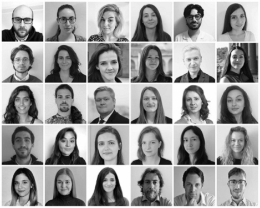Detail
An international study in 19 countries confirms the validity of one of the most important theories in behavioural sciences
An international collaboration replicated one of the most influential studies in the field of behavioural sciences, the study that led to the prospect theory, which changed the wat to understand how people make decisions and interpret risks. The study has tested the results of the article published by Daniel Kahneman and Amos Tversky in 1979. This work was so impressive that Kahneman was awarded the Nobel Prize in Economics in 2002, and it is the most cited study in economics and one of the most cited in social sciences.
Anna Cortijos Bernabeu, former student of the Faculty of Psychology, took part in this study while she was studying the master’s degrees in Research on Behaviour and Cognition and Psychosocial Intervention. The study, published in the journal Nature Human Behaviour, was carried out as part of the Junior Research Programme, a research program managed by volunteer academicians and students, which offers the opportunity to start in the field of research in an international context.
A sample with more than 4,000 people
The study was based on a large international sample, larger than the one in the original study, with data taken from more than 4,000 people from nineteen countries and speakers of thirteen languages. Researchers, supervised by Kai Ruggeri, from Columbia University, used very similar methods to the ones from the 1979 study.
Participants received seventeen questions –the same ones from the original study– on decisions that involved potential financial gains or losses, such as “Would you rather win 3,000 euros with a 100% probability of winning or losing, or 4,000 euros with a 80% probability and 20% of getting nothing?”. According to the researchers, results show people prefer the first option, although the second one, in average, provides a higher sum. People would rather lose 4,000 euros with a 80% probability than losing 3,000 with a 100% probability of losing, although the former option involves a higher loss, in average.
“In these examples we can see that people do not act rationally; we are more likely to choose the risky option when the second one offers a certain gain, albeit a lower amount. However, we are more likely to accept the riskier option when the alternative shows a certain loss, albeit lower”, notes Anna Cortijos.
Response patterns were similar to the original study
These results confirm that response patterns in decision-taking in risky situations are similar to the ones in the original study, although the size of its effect is inferior. “We can still say that people take more risks to avoid a loss but we assume less risks when we are offered choices presented as potential gains. Also, this fact seems to be general in many parts of the world”, notes the researcher.
Research against result replication crisis
The importance of this study is framed within the result replication crisis undergone in psychology and other related sciences. During the last years, theories that were consolidated have been questioned due a lack of work reproducing results of the studies they were based on. “The prospect theory, now consolidated, has been used to implement guidelines, strategies and public policies in areas ranging from economics to behavioural sciences. Therefore, having replicated results is very relevant and a reason to be relieved”, concludes Anna Cortijos.



